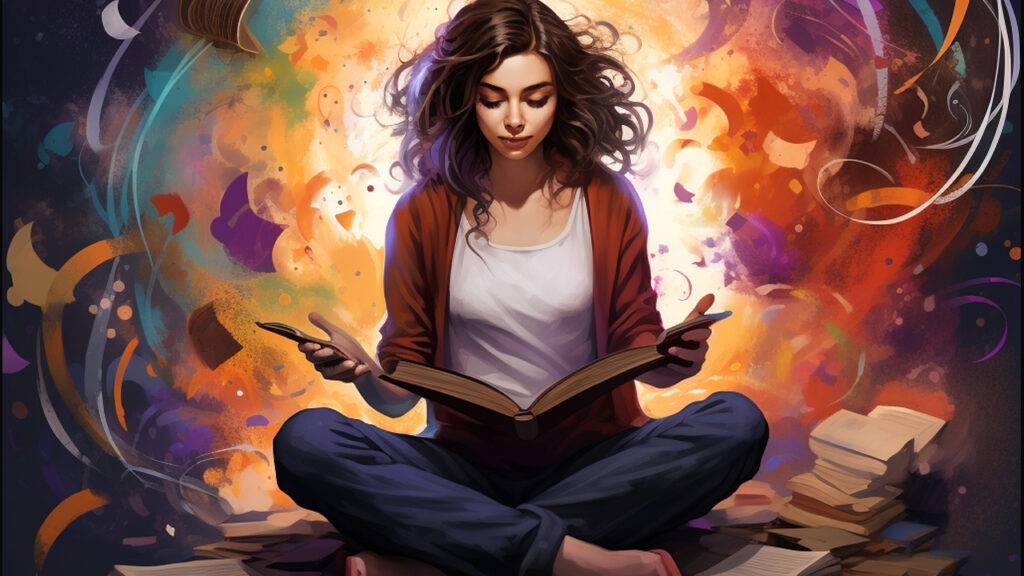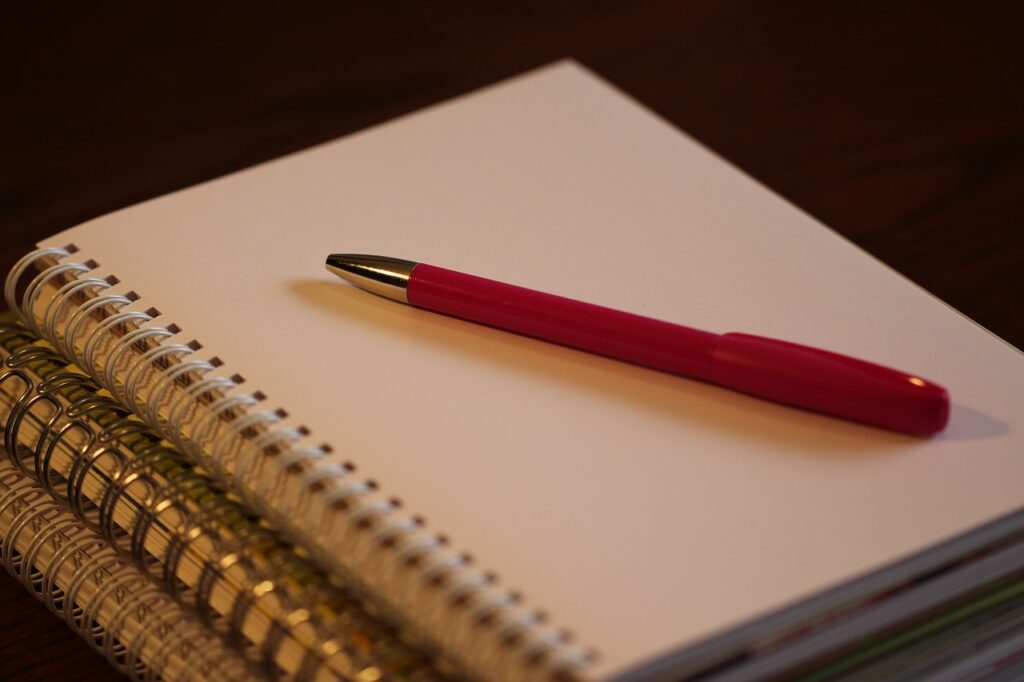
Welcome to another enriching session of Sunday Writer Meditation, where we dive deep into the creative waters and navigate the challenges that often arise on the writer’s journey. Today, we set our sights on a formidable adversary that every writer encounters at some point: writer’s block.
Writer’s block, like an uninvited guest, can halt our creative progress and leave us feeling stranded in a sea of blank pages. It’s a challenge that knows no bounds, affecting both seasoned wordsmiths and budding scribes alike. But fear not, for within the labyrinth of writer’s block lies the potential for growth, resilience, and renewed inspiration.
In this meditation, we’ll embark on a journey to uncover the roots of writer’s block, understand its manifestations, and, most importantly, learn how to break through its barriers. Through mindful practices, introspection, and the power of community, we’ll explore strategies to cultivate not just creativity but also creative resilience.
So, whether you’re currently wrestling with writer’s block or simply seeking tools to fortify your creative spirit, join us as we embark on a voyage of self-discovery and empowerment. Together, we’ll navigate the turbulent waters of writer’s block, emerging with renewed enthusiasm and the knowledge that resilience can be our guiding star.

Understanding Writer’s Block
Writer’s block is the shadow that occasionally falls across the path of every writer’s creative journey. It’s an adversary that knows no discrimination, affecting both novice writers and seasoned authors. To conquer it, we must first understand its nature.
Defining Writer’s Block
Writer’s block is not a single, monolithic entity but a complex and multifaceted phenomenon. At its core, it’s an impediment that obstructs the flow of creativity. It’s that daunting moment when you stare at a blank page, and the words refuse to come. It’s the frustration of having ideas but feeling unable to translate them into coherent prose.
Recognising Its Manifestations
Writer’s block wears many masks, and its manifestations can vary widely from one writer to another. For some, it might manifest as a paralysing fear of inadequacy, a nagging voice that whispers, “You’re not good enough.” For others, it may appear as a stark absence of ideas or motivation, leaving them feeling adrift in a sea of uncertainty.
The Emotional and Psychological Aspects
Beyond the physical act of not writing, writer’s block often comes with a range of emotional and psychological effects. It can lead to feelings of frustration, self-doubt, and even anxiety or depression. The act of creation becomes fraught with stress, transforming something that once brought joy into a source of anguish.
Voices of Experience
It’s worth noting that even some of the most celebrated writers in history have faced writer’s block. F. Scott Fitzgerald, for instance, wrote in his essay “The Crack-Up” about the despair he experienced when trying to write after achieving literary success. These accounts serve as a reminder that writer’s block is a shared experience among writers and not a reflection of one’s worth as a creator.
Understanding the nature and complexity of writer’s block is the first step toward conquering it. As we delve deeper into our meditation, we’ll explore the origins of this formidable obstacle and unveil strategies to navigate its challenging terrain.

The Origins of Writer’s Block
To navigate the labyrinth of writer’s block effectively, we must first understand its origins. Just as every story has a beginning, writer’s block has its roots in various factors that can hinder our creative flow.
The Fear Factor
One of the most common culprits behind writer’s block is fear. It’s the fear of not being good enough, the fear of criticism, and the fear of failure. These fears can paralyse us, trapping our creativity behind a wall of self-doubt. But remember, every writer, no matter how accomplished, has grappled with these same fears.
Self-Imposed Pressure
Writers often impose immense pressure on themselves to produce perfection in every sentence and paragraph. This perfectionist mindset can stifle creativity because it creates an unrealistic expectation of flawlessness. In reality, writing is an iterative process, and every draft, no matter how imperfect, is a stepping stone toward improvement.
Routine and Stagnation
Sometimes, writer’s block can stem from a stagnant routine. Writing in the same place, at the same time, with the same tools can lead to creative exhaustion. The lack of novelty and variety can sap our inspiration. Breaking free from a rigid routine can often reignite the spark of creativity.
External Pressures
External pressures, such as deadlines, expectations from others, or the desire for recognition, can also contribute to writer’s block. The weight of these external factors can loom large, overshadowing the joy and freedom that writing should bring.
Life Events and Circumstances
Personal life events and circumstances can disrupt our writing flow. Whether it’s dealing with personal challenges, major life changes, or unexpected events, these external factors can pull our focus away from writing and create a barrier that seems insurmountable.
Understanding the origins of writer’s block is akin to unravelling the plot of a complex story. It allows us to identify the specific challenges we face and develop targeted strategies to overcome them. In the following sections, we’ll delve deeper into these strategies, exploring how to break free from the shackles of writer’s block and cultivate a resilient, creative spirit.

Breaking the Chains: Strategies for Overcoming Writer’s Block
Writer’s block may be a formidable foe, but it is not invincible. There are practical strategies and exercises that can help you break through its barriers and reignite your creative spark. Let’s explore these tools that will empower you to overcome writer’s block.
1. Freewriting: Sometimes, the mere act of putting words on paper, without the pressure of perfection, can break the block. Set aside dedicated time for freewriting, allowing your thoughts to flow without self-criticism. You might be surprised by the gems that emerge from this free-spirited exercise.
2. Writing Prompts: Writing prompts can serve as your creative lifeline. They offer a starting point when you’re stuck and can lead you down unexpected paths. Use prompts related to your current project or explore unrelated topics to invigorate your imagination.
3. Mindfulness and Meditation: Incorporating mindfulness practices into your writing routine can help you reconnect with your creative self. Deep breathing, meditation, and mindfulness exercises can ease anxiety and self-doubt, making room for inspiration to flow.
4. Set Realistic Goals: Instead of aiming for a flawless masterpiece, set achievable writing goals. Break your project into smaller, manageable tasks. Celebrate small victories along the way. Progress, no matter how incremental, is still progress.
5. Change of Environment: Sometimes, a change in scenery can do wonders for your creativity. Escape your usual writing space and explore new environments. A park bench, a bustling café, or even a quiet library may provide the fresh perspective you need.
6. Embrace Imperfection: Accept that your first draft doesn’t need to be perfect. Allow yourself to write badly, knowing that you can revise and improve later. The freedom to make mistakes can liberate your creativity.
7. Collaborate and Seek Feedback: Sharing your work with others, whether through collaboration or seeking feedback, can help you see your writing from different angles. Constructive criticism can illuminate blind spots and inspire revisions.
8. Creative Exercises: Engage in creative exercises that stimulate your mind and foster new ideas. Try word association games, brainstorming sessions, or creative writing exercises that challenge your imagination.
9. Take Breaks and Rest: Pushing yourself relentlessly can lead to burnout. Give yourself permission to take breaks and rest. Sometimes, stepping away from your work for a while can lead to breakthrough moments.
10. Connect with Fellow Writers: Joining a community of fellow writers can provide essential support and motivation. Sharing experiences and challenges with others who understand the writer’s journey can be inspiring.
Remember, writer’s block is a temporary obstacle on your creative path, not an insurmountable wall. By incorporating these strategies into your writing routine, you can equip yourself with the tools needed to break free from its chains and continue your journey as a resilient writer.
In the following sections of this meditation, we’ll explore additional aspects of cultivating creative resilience and nurturing your creativity in the face of challenges.

Nurturing Your Creative Well
In the relentless pursuit of creativity, it’s essential to remember that your creative well is not an infinite source. It requires care, replenishment, and mindful attention. Nurturing your creative well is not just about overcoming writer’s block but also about sustaining a thriving creative spirit.
- Mindful Self-Care: Begin by practising mindful self-care. Dedicate time to activities that rejuvenate your mind and body, whether it’s taking long walks, reading voraciously, or indulging in hobbies that ignite your passion. A well-nourished self is a fertile ground for creativity.
- Exploration and Curiosity: Cultivate curiosity as if you were a child exploring a world full of wonders. Delve into new experiences, read widely, and engage with diverse perspectives. Your creative well thrives on the richness of experiences and the tapestry of ideas.
- Reflection and Journaling: Keep a reflective journal where you jot down insights, ideas, and observations. Regularly revisiting your journal can rekindle past sparks of inspiration and offer fresh perspectives on old concepts.
- Unplug and Reconnect: In our digital age, constant connectivity can be a creativity killer. Take breaks from screens, social media, and notifications. Disconnect to reconnect with your inner thoughts and the world around you.
- Creative Rituals: Develop personal creative rituals that signal to your mind that it’s time to enter the creative zone. This could be lighting a specific candle, listening to a particular piece of music, or practising a brief meditation before writing.
- Continual Learning: Embrace the notion that learning is an ongoing journey. Seek out opportunities to expand your knowledge and skills, whether through courses, workshops, or simply exploring new subjects. Each new nugget of wisdom can fuel your creativity.
- Embrace Vulnerability: Allow yourself to be vulnerable in your creative process. Often, the most profound works of art emerge from a place of emotional authenticity. Embrace the full spectrum of your emotions and channel them into your writing.
- Celebrate Small Wins: Celebrate your achievements, no matter how minor they may seem. Completing a chapter, receiving positive feedback, or conquering writer’s block are all milestones worth acknowledging. Celebrating these wins can boost your confidence and motivation.
- Mindful Consumption: Be mindful of what you consume—both in terms of media and information. Surround yourself with content that inspires, challenges, and nourishes your creative spirit. Avoid sources that drain your energy or creativity.
- Community and Collaboration: Engage with a creative community or collaborate with fellow writers. Sharing ideas, challenges, and successes can provide fresh perspectives and foster a sense of camaraderie that bolsters your creative journey.
Nurturing your creative well is not a one-time task but an ongoing practice. It’s the foundation upon which your resilience as a writer rests. By tending to your creative well with care and intention, you ensure that it remains a vibrant source of inspiration, even in the face of writer’s block.

The Role of Inspiration and Motivation
Inspiration and motivation are the twin engines that drive a writer’s creativity. They are the wind in your sails, propelling you forward on your writing journey. But how do you harness these forces to break through writer’s block and cultivate creative resilience?
Seeking Inspiration
Inspiration often strikes when we least expect it. It can come from a breathtaking sunset, a poignant conversation, or a memorable dream. Writers have long been known to find inspiration in the world around them. Embrace this truth: inspiration is everywhere.
Observation: Train yourself to be an observer of life’s nuances. Pay attention to the details—the subtle expressions on people’s faces, the changing seasons, the play of light and shadow. These observations can be wellsprings of inspiration for your writing.
Reading Widely: The words of other authors can be a well of inspiration. Reading widely across genres and styles exposes you to different storytelling techniques, voices, and perspectives. It can spark new ideas and ways of approaching your own writing.
Nature and Solitude: Sometimes, inspiration blooms in moments of solitude and connection with nature. Take walks in the woods, sit by a quiet lake, or simply spend time in silence. Nature has a way of whispering its secrets to those who listen.
Motivation to Persist
While inspiration can ignite your creativity, motivation is what keeps you writing, especially when faced with writer’s block. It’s the inner fire that propels you to write even on the toughest days.
Setting Goals: Establish clear and achievable writing goals. Having a target to aim for can provide the motivation you need to push through obstacles. Whether it’s a word count, a chapter draft, or a submission deadline, goals keep you on track.
Accountability: Share your writing goals with a trusted friend or writing group. The sense of accountability can be a powerful motivator. Knowing that others are expecting your work can spur you into action.
Mindset and Positivity: Cultivate a positive mindset. Replace self-doubt with self-belief. Remind yourself of past achievements and overcome challenges. A positive attitude can help you navigate writer’s block with resilience.
Celebrate Progress: Celebrate every step of your writing journey. Completing a challenging scene, revising a chapter, or simply showing up to write are all victories. Celebrate these moments, and let them fuel your motivation.
Stay Connected to Your Why: Reconnect with the core reasons why you write. What drives you to tell stories? What messages or emotions do you want to share with the world? Keeping your “why” at the forefront of your mind can rekindle your motivation.
Mindfulness and Presence: Practice mindfulness in your writing. Be fully present in the act of creation rather than focusing solely on the end result. Embrace the joy and satisfaction that writing brings, even during moments of writer’s block.
Inspiration and motivation are the inner forces that can lead you out of the darkest corners of writer’s block. By actively seeking inspiration and nurturing your motivation, you’ll discover the resilience to keep moving forward, pen in hand.

Meditation Session: Breaking Through Writer’s Block
In this meditation session, we will embark on a journey to break through writer’s block and reconnect with our innate creativity. Find a quiet and comfortable place to sit or lie down. Close your eyes and take a few deep, cleansing breaths to settle into the present moment.
Step 1: Grounding Breath
Begin by focusing on your breath. Inhale deeply through your nose, feeling the air fill your lungs. As you exhale, release any tension or doubts. Imagine these negative energies leaving your body with each breath. Feel yourself becoming grounded with every exhalation.
Step 2: Visualisation of Creativity
With each breath, imagine a wellspring of creativity residing within you. Visualise it as a deep, clear pool of water, shimmering with potential. As you continue to breathe, see this pool of creativity growing larger and more vibrant. Feel the creative energy expanding within you.
Step 3: Overcoming the Block
Now, turn your attention to the writer’s block that has been hindering your progress. Visualise it as a solid wall that stands before your pool of creativity. As you breathe in deeply, imagine a warm, golden light surrounding the block. This light represents your determination and resilience.
With each breath, see the golden light gently dissolving the block. It softens and crumbles until it fades away entirely, revealing the vast pool of creativity behind it. Feel a sense of relief and liberation as you witness the block’s transformation.
Step 4: Connecting with Ideas
As the block dissolves, allow your mind to wander freely. You are now in a space where ideas flow effortlessly. Visualise these ideas as colourful butterflies dancing around you. Each one represents a unique and inspiring concept waiting to be captured in your writing.
Step 5: Writing Flow
Imagine yourself picking one of these butterflies—the idea that resonates with you the most. See it landing on your open notebook or computer screen. As you start to write, feel the words flowing effortlessly from your mind to the page. There is no resistance, only a harmonious flow of creativity.
Step 6: Embrace the Joy
As you write, relish in the joy of creation. Feel the excitement of bringing your ideas to life. Know that you have the power to overcome writer’s block whenever it arises. You are a resilient writer, capable of breaking through any creative obstacle.
Step 7: Gratitude and Closure
Take a final deep breath, expressing gratitude for this meditation session and the renewed sense of creativity it has bestowed upon you. Slowly open your eyes, carrying this creative energy with you as you return to your writing journey.
Remember that writer’s block is not an insurmountable barrier. It’s a challenge that can be overcome with patience, mindfulness, and resilience. By embracing this meditation practice, you empower yourself to break through writer’s block whenever it appears, allowing your creativity to flow freely.

Journaling: Insights and Action Steps
After completing the meditation session, it’s essential to capture the insights and ideas that emerged during your journey of breaking through writer’s block. Journaling serves as a powerful tool for preserving your newfound creativity and translating it into actionable steps for your writing.
Reflect on Your Meditation Experience: Take a moment to reflect on how you felt during the meditation. Did you experience a shift in your mindset or a surge of creative energy? Were there specific ideas or concepts that stood out to you? Write down your initial thoughts and emotions.
Transcribe Your Creative Ideas: If any creative ideas or solutions to your writer’s block surfaced during the meditation, now is the time to transcribe them into your journal. These may be fresh story concepts, character developments, or innovative approaches to your current writing projects.
Identify Actionable Insights: Review your journal entries and identify actionable insights. These are the nuggets of wisdom and clarity that can guide your writing journey. Consider how you can apply these insights to your creative work.
Set Clear Writing Goals: Based on your insights, set clear and achievable writing goals. Whether it’s a daily word count target, a revision schedule, or a commitment to write without self-criticism, define what you aim to accomplish in the coming days and weeks.
Create a Writing Schedule: Develop a writing schedule that aligns with your goals. Dedicate specific time slots for your writing practice, and stick to them as consistently as possible. Having a structured routine can help you maintain creative resilience.
Embrace Mindful Writing: As you write, embrace the principles of mindful writing. Stay present in the act of creation, focusing on the flow of words and ideas rather than worrying about perfection. Be gentle with yourself and allow creativity to flourish.
Reflect on Progress: Regularly revisit your journal to reflect on your progress. Celebrate your achievements, no matter how small, and acknowledge any challenges you’ve faced. Use your journal as a compass to navigate your creative journey.
Stay Open to Change: Embrace the fluidity of creativity. Be open to change and experimentation in your writing process. If you encounter new challenges or writer’s block in the future, return to this meditation and journaling practice to regain your creative resilience.
Express Gratitude: Conclude your journaling session by expressing gratitude for your creativity and the ability to break through writer’s block. Gratitude can amplify positive emotions and serve as a constant source of motivation.
Action Steps: Write down specific action steps you plan to take in your writing journey based on your insights. These steps may include starting a new project, revising existing work, seeking feedback, or exploring new genres.
Journaling serves as a bridge between your meditation experience and your writing practice. It allows you to capture the essence of your creative resilience and translate it into tangible actions that propel your writing forward. By regularly journaling your insights and setting clear goals, you’ll continue to cultivate your creative spirit and overcome writer’s block with confidence.

Conclusion: Cultivating Creative Resilience
As we conclude this meditation session, let’s take a moment to reflect on the journey we’ve embarked upon. Breaking through writer’s block is not just a momentary triumph; it’s a testament to your creative resilience. You possess the inner strength to overcome obstacles and keep the words flowing.
Key Takeaways
Writer’s Block is Temporary: Remember that writer’s block, like clouds passing in the sky, is temporary. With mindfulness and determination, you can dissolve its hold on your creativity.
Embrace Your Creativity: Your creativity is a well that never runs dry. By nurturing it through meditation, reflection, and action, you ensure that your words will always find their way to the page.
Mindfulness is a Powerful Tool: Mindfulness isn’t just about writing; it’s about living your life with intention. The skills you’ve cultivated here can be applied to various aspects of your creative journey.
Resilience Fuels Progress: Every step you take to overcome writer’s block, no matter how small, contributes to your growth as a writer. Resilience is the fuel that propels you forward.
More Sunday Writer Meditations to Come
Now that you’ve experienced the transformative power of meditation in breaking through writer’s block, we invite you to continue your meditation journey with us. Join our Sunday Writer Meditation series as we explore diverse themes, cultivate creativity, and nurture our writer’s spirit.
Stay Connected: Connect with a community of writers who are dedicated to supporting each other on this creative journey. Share your experiences, insights, and challenges. Together, we grow stronger.
Explore Our Call for Submissions: Are you a science fiction writer with an incredible story to tell? We are currently accepting submissions for our upcoming science fiction novel collection. This is your opportunity to share your vision with the world.
Embrace Your Creative Resilience: You have the power to overcome any obstacle that comes your way. Writer’s block is just a chapter in your writing story, not the end. Embrace your creative resilience and continue crafting your narratives.
Thank you for joining us in this meditation session. We look forward to sharing more meditative practices and supporting your creative journey in the weeks to come.
Remember, your words hold immense power, and within you resides the strength to shape them into narratives that resonate.


